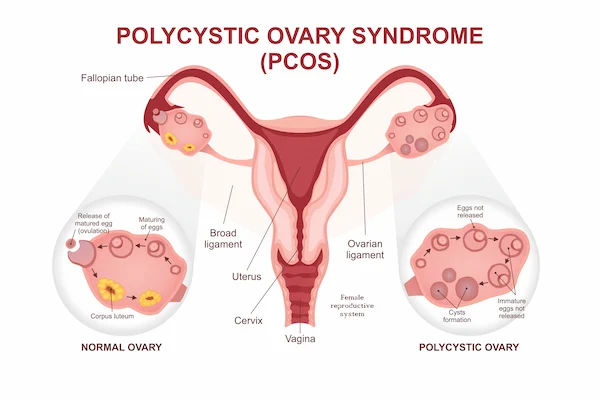What Leads To Delayed Period
Experiencing a late or missed period? Learn about the common causes of a delayed period, from stress and lifestyle factors to medical conditions, and when to see a doctor.


Introduction
The menstrual cycle is a complex, finely tuned dance of hormones, primarily estrogen and progesterone. It’s orchestrated by your brain (the hypothalamus and pituitary gland) and executed by your ovaries. A typical cycle lasts between 21 and 35 days, but regularity is more important than the exact length. Ovulation, the release of an egg, is the central event. If the egg isn't fertilized, hormone levels drop, triggering your period. A delayed period, or missed period, essentially means that this hormonal sequence has been disrupted at some point, preventing the uterine lining from shedding on schedule. This disruption can stem from countless sources, which we will explore in detail.
Top Causes of a Delayed Period
1. Stress and Its Impact on Hormones
Chronic stress is a prime culprit for a delayed period. When you're under constant physical or emotional stress, your body produces high levels of cortisol, the "stress hormone." Elevated cortisol can interfere with the hypothalamus, the part of your brain responsible for regulating your cycle. This can halt ovulation, leading to a late period or even missed periods for months (a condition known as functional hypothalamic amenorrhea). Managing stress through yoga, meditation, or therapy can often help restore cycle regularity.
2. Polycystic Ovary Syndrome (PCOS)
PCOS is a common hormonal disorder affecting up to 10% of women of reproductive age. It's characterized by an imbalance of reproductive hormones, which can prevent ovulation entirely. Without ovulation, the period doesn't occur. Women with PCOS often experience symptoms like irregular periods, excess facial hair, acne, and weight gain. If you suspect PCOS is the reason for your missed period but not pregnant, it's crucial to consult a doctor for diagnosis and management.
3. Significant Weight Changes
Your body fat percentage plays a key role in hormone production. Being significantly underweight can cause your body to stop producing estrogen, leading to ceased ovulation and periods. Conversely, being overweight can lead to excess estrogen production, which can also disrupt your cycle and cause irregular bleeding or delayed periods. Achieving and maintaining a healthy weight for your body type is often recommended to regulate menstruation.
4. Excessive Exercise
Intense physical training can burn more calories than you consume and lower your body fat percentage significantly. This stresses the body and can suppress reproductive hormones needed for ovulation. This is common among athletes, ballet dancers, and anyone who suddenly ramps up their workout intensity. If your delayed period coincides with a new, strenuous fitness regime, it might be your body's signal to pull back slightly.
5. Thyroid Disorders
The thyroid gland, located in your neck, regulates your metabolism, but it also interacts with your reproductive system. Both an overactive thyroid (hyperthyroidism) and an underactive thyroid (hypothyroidism) can cause menstrual irregularities, including light, heavy, or infrequent periods. A simple blood test can diagnose a thyroid issue, which is often easily managed with medication. If your condition does not improve after trying these methods, book a physical visit to a doctor with Apollo24|7 for a thorough evaluation.
6. Perimenopause and Early Menopause
Perimenopause is the transition phase leading up to menopause, often starting in a woman's 40s. During this time, estrogen levels become erratic, leading to classic symptoms like hot flashes, night sweats, and increasingly irregular periods. While it's a natural process, the onset of early menopause (before age 40) is also possible and is a medical condition that requires attention.
7. Chronic Illnesses
Ongoing health conditions like uncontrolled diabetes or Celiac disease can impact your menstrual cycle. The inflammation and nutritional malabsorption associated with these diseases can disrupt the delicate hormonal balance necessary for regular ovulation. Getting the underlying condition under control is key to restoring cycle regularity.
Consult Top Specialists
Other Potential Reasons for a Late Period
8. Medications and Birth Control
Certain medications are known to affect menstruation. These include:
- Antipsychotics & Antidepressants
- Chemotherapy drugs
- Blood pressure medications
- Allergy medications
- Furthermore, hormonal birth control works by suppressing ovulation.
When you stop taking it, it can take several months for your body to resume its natural ovulation cycle, leading to a delayed period. Similarly, long-acting reversible contraceptives (LARCs) like IUDs or implants can cause periods to become lighter, less frequent, or stop altogether.
9. Breastfeeding (Lactational Amenorrhea)
Prolactin, the hormone responsible for milk production, suppresses ovulation. This is why exclusively breastfeeding women often do not get their periods for many months postpartum. This is known as lactational amenorrhea and is a natural, though not foolproof, form of birth control. Periods typically return once you start supplementing with formula or solid foods.
When a Delayed Period Might Mean Pregnancy
Early Signs of Pregnancy vs. PMS
If you're sexually active, pregnancy is a leading cause of a missed period. The symptoms of early pregnancy and premenstrual syndrome (PMS) can be remarkably similar, which can be confusing.
Shared Symptoms: Tender breasts, fatigue, mood swings, and bloating.
More Unique to Pregnancy: A missed period is the most obvious sign. Others include nausea (morning sickness), frequent urination, and a heightened sense of smell. The only way to know for sure is to take a home pregnancy test. If you get a negative test but your period still doesn't arrive, wait a few days and test again or consult a doctor online with Apollo24|7 for further evaluation.
When to Consult a Healthcare Professional
You should definitely see a doctor if:
- You've missed three or more periods in a row.
- You are over 16 and have never had a period (primary amenorrhea).
- Your periods were regular and suddenly become irregular.
- You experience severe pain during your period.
- You have unusual bleeding between periods.
- You have other concerning symptoms like unexplained weight loss, hair growth on your face, or milky nipple discharge.
Diagnosis: What to Expect
To diagnose the cause of your delayed period, a doctor will likely:
1. Take a detailed medical history.
2. Perform a physical exam, including a pelvic exam.
3. Order blood tests to check hormone levels (thyroid, prolactin, estrogen, progesterone, testosterone) and rule out pregnancy. Apollo24|7 offers a convenient home collection for tests like these.
4. Conduct an ultrasound to look for issues in your uterus, ovaries, or thyroid.
Conclusion: Listening to Your Body's Signals
A single delayed period is often nothing to worry about and can be a normal response to life's fluctuations. However, consistently irregular cycles are your body's way of signaling that something may be out of balance. Whether it's high stress, a nutritional deficit, or an underlying condition like PCOS or a thyroid disorder, understanding the root cause is empowering. Pay attention to the patterns, track your cycle, and don't hesitate to seek professional guidance. Your menstrual health is a vital sign, just like your blood pressure or heart rate. Prioritizing it is an essential part of your overall well-being. If your symptoms persist, take the next step and connect with a healthcare provider to get the answers and care you deserve.
Quick Takeaways
- Stress, significant weight changes, and intense exercise are common lifestyle causes of a delayed period.
- Underlying conditions like PCOS and thyroid disorders are frequent medical reasons for irregular cycles.
- Hormonal birth control can affect your period during and after use.
- Always rule out pregnancy with a test if you're sexually active.
- See a doctor if you miss three or more periods, have severe pain, or other unusual symptoms.
- Tracking your cycle can help you identify patterns and potential triggers.
Consult Top Specialists
Consult Top Specialists

Dr. Mona Yadav
Obstetrician and Gynaecologist
19 Years • MBBS, MD (Obstetrics & Gynaecology)
Dombivli
Nulife multispeciality, Dombivli

Dr. Parul Sharma
Obstetrician and Gynaecologist
8 Years • MBBS, MS (Obstetrics & Gynaecology)
New Delhi
THE DOCTORS NESST, New Delhi

Dr. Debajyoti Goswami
Obstetrician and Gynaecologist
10 Years • MBBS,D.G.O(DNB),Adv. Infertility Tech.(AIIMS),Fellowship in Diabetes(U.K),Comprehensive Abortion Care(Govt. Of W.B), Certificate in Clinical Embryology(AIIMS, BHUBANESWAR)
Bankura
D.G Clinic, Bankura
(25+ Patients)
Dr. K Anusha
Obstetrician and Gynaecologist
4 Years • MBBS, DGO
Yemmiganur
SRINIVASAA HOSPITAL, Yemmiganur
Dr. J Aswini Sowndarya
Obstetrician and Gynaecologist
4 Years • MBBS, MS Obstetrics & Gynaecology, FMAS, FART
Rajamahendravaram
Tholat Memorial Multi Speciality Hospital, Rajamahendravaram
Consult Top Specialists

Dr. Mona Yadav
Obstetrician and Gynaecologist
19 Years • MBBS, MD (Obstetrics & Gynaecology)
Dombivli
Nulife multispeciality, Dombivli

Dr. Parul Sharma
Obstetrician and Gynaecologist
8 Years • MBBS, MS (Obstetrics & Gynaecology)
New Delhi
THE DOCTORS NESST, New Delhi

Dr. Debajyoti Goswami
Obstetrician and Gynaecologist
10 Years • MBBS,D.G.O(DNB),Adv. Infertility Tech.(AIIMS),Fellowship in Diabetes(U.K),Comprehensive Abortion Care(Govt. Of W.B), Certificate in Clinical Embryology(AIIMS, BHUBANESWAR)
Bankura
D.G Clinic, Bankura
(25+ Patients)
Dr. K Anusha
Obstetrician and Gynaecologist
4 Years • MBBS, DGO
Yemmiganur
SRINIVASAA HOSPITAL, Yemmiganur
Dr. J Aswini Sowndarya
Obstetrician and Gynaecologist
4 Years • MBBS, MS Obstetrics & Gynaecology, FMAS, FART
Rajamahendravaram
Tholat Memorial Multi Speciality Hospital, Rajamahendravaram
More articles from Menstrual Disorder
Frequently Asked Questions
How long can stress actually delay your period?
Stress can delay your period by a few days or even several weeks. In cases of extreme chronic stress, it can lead to missed periods for months. Once the stress is managed, your cycle should return to normal within 1-3 months.
I have a negative pregnancy test but no period. What does this mean?
A negative test with a missed period strongly suggests something else is disrupting your cycle. Common reasons include high stress, recent illness, weight changes, hormonal imbalances like PCOS, or thyroid issues. If it persists, consult a doctor.
Can a sudden change in diet cause a late period?
Absolutely. Drastic calorie restriction, fad diets, or significant nutritional deficiencies can signal to your body that it's not a safe time for reproduction. This can shut down ovulation and lead to a delayed period.
What are the first signs of perimenopause?
The earliest signs are often changes in your menstrual cycle—periods may become closer together, further apart, heavier, or lighter. Other common signs include hot flashes, sleep problems, and mood swings.
How can I get my period back naturally?
Focus on lifestyle factors: reduce stress through mindfulness, ensure you're eating a balanced diet with enough calories and healthy fats, maintain a moderate exercise routine, and achieve a healthy weight. Always consult a doctor before making major changes.


